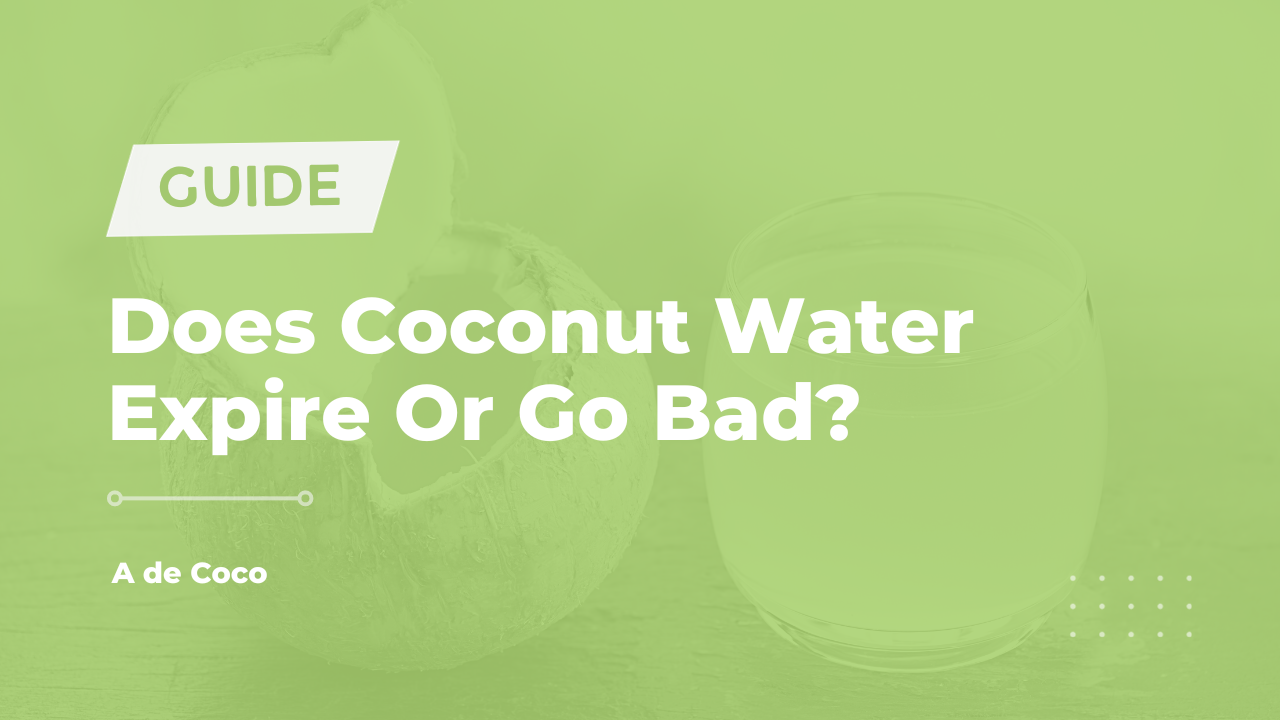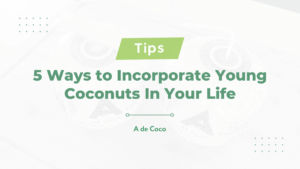Many people enjoy the tropical, refreshing taste of coconut water, relishing in the numerous health benefits it brings.
This seemingly magical elixir has gained popularity for its hydrating effects, potassium content, and metabolic benefits.
However, one crucial question pops up when it comes to its consumption – the freshness and longevity of coconut water.
With its ever-growing popularity, it is important to address this matter to ensure that consumers are making informed decisions when enjoying their healthy drink.
This blog post will delve into the factors affecting the shelf-life of coconut water.
We will also investigate the signs that indicate the beverage might have spoiled, ensuring safe consumption for all.
Contents
- Does Coconut Water Expire Or Go Bad?
- Factors Determining the Shelf-Life of Coconut Water
- How Long Does Unopened Coconut Water Last?
- What Affects the Longevity of Coconut Water Once Opened?
- Importance of Storing Coconut Water Correctly Post Opening
- How to Store Opened and Unopened Coconut Water
- Can Coconut Water Expire If Kept in the Fridge?
- Signs and Symptoms Of Spoiled Coconut Water
- Does the Quality of Coconut Water Deteriorate Over Time?
- Final Thoughts
Does Coconut Water Expire Or Go Bad?
Yes, coconut water can expire and go bad. Like most natural products, once opened, coconut water introduces bacteria that begins to ferment it, affecting its taste and safety. Unopened, it can last for several months due to the pasteurization process but should be consumed within a week or two after opening and stored in the refrigerator to maintain its freshness.
Moving forward, it’s essential to delve deeper into the characteristics and properties of coconut water, to fully grasp why it behaves the way it does when exposed to certain conditions.
This knowledge will provide a clearer and safer understanding on how to store and consume this tropical beverage.
This article will explore the science behind the spoilage and fermentation process of coconut water and provide you with additional valuable tips on how to store it correctly and identify when it has gone bad.
Let’s expand our understanding and ensure that your coconut water consumption is both enjoyable and safe.
Factors Determining the Shelf-Life of Coconut Water
When it comes to shelf-life, coconut water is no different from other natural beverages – various factors can significantly influence its longevity.
Method of Packaging
The packaging method used for coconut water can significantly influence its shelf-life.
Commercially packaged coconut water usually undergoes high-temperature short-time (HTST) pasteurization, a process known to eliminate harmful bacteria and prolong shelf-life.
This process also allows the beverage to remain unrefrigerated until opened.
Therefore, commercial coconut water brands can sit on shelves for up to 18 months without spoiling, thanks to HTST.
The packaging method used for coconut water can significantly influence its shelf-life.
Commercially packaged coconut water usually undergoes high-temperature short-time (HTST) pasteurization, a process known to eliminate harmful bacteria and prolong shelf-life.
However, this method is not without its drawbacks.
The major criticism against HTST is that it may reduce the nutritional content and alter the natural taste of coconut water, leading to a compromise in quality.
Storage Conditions
Storage conditions have a direct impact on the duration coconut water remains good.
Factors such as temperature, light, and humidity can affect the shelf-life of this beverage.
Exposing coconut water to higher temperatures and direct light may quicken spoilage due to bacterial growth.
On the other hand, storing the beverage in colder temperatures can slow down bacterial growth, prolonging its freshness.
Hence, unopened coconut water should be kept in a cool and dark place, such as a pantry, for optimum shelf-life.
Storage conditions have a direct impact on the duration coconut water remains good.
Factors such as temperature, light, and humidity can affect the shelf-life of this beverage.
It is essential to understand, though, that once opened, the beverage should be refrigerated and consumed within 24 to 48 hours.
This short window is due to the lack of preservatives in coconut water, which makes it susceptible to spoiling once exposed to oxygen and warm temperatures.
Preservatives and Additives
Some commercial brands utilize preservatives and additives in their coconut water, influencing the product’s shelf-life.
Preservatives help suppress bacterial growth, therefore extending the longevity of the beverage.
On the other hand, some brands offer all-natural, non-pasteurized coconut water free from any additives.
While this is an attractive option to health-conscious consumers, such products often have a shorter shelf-life and require refrigeration even before opening.
Preservatives help suppress bacterial growth, therefore extending the longevity of the beverage.
On the other hand, some brands offer all-natural, non-pasteurized coconut water free from any additives.
While this is an attractive option to health-conscious consumers, such products often have a shorter shelf-life and require refrigeration even before opening.
Given the various factors discussed above, it is clear that the choice of coconut water – from the packaging method to the storage conditions and usage of preservatives – can considerably influence its shelf-life.
Therefore, it is crucial to make suitable choices based on personal preferences for shelf-life and natural content.
How Long Does Unopened Coconut Water Last?
An unopened container of coconut water, kept in optimal storage conditions, can generally last between 18 months to 2 years past the date written on the packaging.
Longevity mainly depends on storage conditions and the processing methods employed in packaging.
Packaging and Processing Methods
It’s important to understand that packaging and processing methods play a substantial role in determining the shelf-life of unopened coconut water.
Product manufacturers often use High Pressure Processing (HPP), which eliminates bacteria and other pathogens while preserving the taste and nutritional content of the water.
This method, unlike pasteurization, does not subject the coconut water to high heat, which can deteriorate its quality and flavor.
This method, unlike pasteurization, does not subject the coconut water to high heat, which can deteriorate its quality and flavor.
Because HPP is a cold process, it causes minimal change in the biochemical and nutritional properties of the coconut water, extending its shelf life without affecting its freshness and flavor.
Moreover, the packaging material and the seal strength influence the longevity of coconut water.
Proper Storage Conditions
Even in an unopened state, coconut water needs to be stored correctly to maximize its shelf-life.
The ideal storage place is a cool, dry location, away from direct sunlight.
A pantry or a cupboard that meets these conditions is suitable for storage.
The ideal storage place is a cool, dry location, away from direct sunlight.
Storing coconut water in such conditions ensures that the ambient temperature does not accelerate the spoilage process.
Additionally, stored coconut water should not be subject to frequent temperature fluctuations as this can affect its quality and lead to a shorter shelf life.
So, while unopened coconut water can retain its quality for a significant period, it’s crucial to pay attention to processing and packaging methods and to adhere to proper storage guidelines.
What Affects the Longevity of Coconut Water Once Opened?
Once coconut water is opened, its longevity is affected by a variety of factors.
A notable factor is the environment in which it is stored.
Coconut water is sensitive to heat and light, which can speed up the spoilage process.
Coconut water is sensitive to heat and light, which can speed up the spoilage process.
The light can degrade the nutrients in the water, while heat encourages bacterial growth.
Therefore, once opened, it should ideally be stored in a cool, dark place, such as a refrigerator.
Exposure to Air
Another significant factor is the exposure to air.
Once opened, coconut water begins to oxidize, which can alter its taste and nutritional content.
This process is speeded up by exposing it to air, which in turn speeds up microbial activity.
Once opened, coconut water begins to oxidize, which can alter its taste and nutritional content
To prolong the shelf life of opened coconut water, it is recommended to consume it quickly or store it in an airtight container.
Impact of Contaminants
Last, but not least, another factor affecting the longevity of opened coconut water is the potential introduction of contaminants.
Each time the container is opened, there is a risk of contaminants and bacteria entering the container and causing spoilage.
This is especially risky when the same utensil is used multiple times to extract the coconut water, possibly introducing bacteria each time.
Each time the container is opened, there is a risk of contaminants and bacteria entering the container and causing spoilage.
To mitigate this, always use clean utensils and ensure the outer surface of the container is clean before opening.
Importance of Storing Coconut Water Correctly Post Opening
Once a coconut water bottle or can is opened, the quality deterioration process accelerates dramatically.
Due to its natural origin, coconut water is prone to spoilage, and improper storage can significantly reduce its shelf-life.
Factors such as temperature, light exposure, and the presence of microorganisms can greatly influence the longevity of opened coconut water.
This statement emphasizes that just like any other organic product, opened coconut water is affected by several environmental factors.
Keeping it at room temperature post-opening may allow bacteria and other harmful microorganisms to grow, making it unsafe for consumption much quicker.
Temperature Impact on Opened Coconut Water
The temperature at which opened coconut water is stored plays a critical role in its lifespan post-opening.
At room temperatures, coconut water starts to lose its freshness soon after it is opened, and it might become unsafe to drink in just a few hours.
This happens because room temperatures offer an ideal environment for microorganisms to thrive and multiply, triggering the spoilage process.
By contrast, when stored in properly refrigerated conditions, opened coconut water can last for 1-2 days.
This highlights the role that temperature plays in preserving the freshness of opened coconut water and preventing it from spoiling prematurely.
The colder temperatures of a refrigerator slow down the growth of bacteria and other microorganisms, thereby prolonging the life of the coconut water.
Light Exposure and Opened Coconut Water
The degree of light exposure is another factor to consider when storing opened coconut water.
Light exposure can lead to oxidation, which can result in a change of flavor and color, and eventually lead to spoilage.
It is recommended to store opened coconut water in a tightly sealed container and keep it in a dark, cool place.
This suggestion underlines the significance of reducing light exposure in order to maximize the shelf-life of opened coconut water.
The darker the place, the slower the oxidation process and the longer the coconut water will keep its flavor and freshness.
Remember, the faster you consume the opened coconut water, the less likely you will need to worry about spoilage.
How to Store Opened and Unopened Coconut Water
The way one opts to store coconut water, whether opened or unopened, plays a crucial role in determining its shelf-life and quality.
Let’s delve deeper into ways of storing coconut water appropriately.
Storing Unopened Coconut Water
In the case of unopened coconut water, it tends to have a significantly extended shelf life due to the lack of exposure to oxygen and microbes in the environment.
The store-bought, packaged coconut water comes with a best-before date stamped on its label, duly considered as the manufacturer’s guarantee of optimal freshness and taste.
Usually, unopened coconut water remains fresh up to 3-4 weeks beyond the date mentioned on the package if stored appropriately.
The recommended way of storing unopened coconut water is at room temperature, away from sources of heat and sunlight, as they can degrade its quality over time.
The recommended way of storing unopened coconut water is at room temperature, away from sources of heat and sunlight.
This storage method effectively prevents the acceleration of the degradation process brought on by heat and light exposure.
It keeps the coconut water fresh for extended periods, promising a refreshing taste as long as it’s consumed before its expiry date.
Storing Opened Coconut Water
Once opened, coconut water starts the process of oxidization that can lead to a rapid degradation of the taste and nutritional quality if not stored correctly.
The package of coconut water, once opened, should be sealed tightly and immediately placed in the refrigerator to extend its shelf life.
Opened coconut water, when stored in the fridge at temperatures between 35°F to 40°F, can stay fresh for around a week.
However, the key to maintaining its taste and nutrition is to consume it within 24-48 hours of being opened.
Opened coconut water, when stored in the fridge at temperatures between 35°F to 40°F, can stay fresh for around a week.
This is because, despite the cold storage, the process of oxidization can still occur albeit at a slower pace.
Continuous exposure to oxygen triggers chemical reactions resulting in the degradation of nutrients and promotes the development of off-flavors in coconut water over time.
Conversion to Ice Cubes
An alternate method to extend the life of opened coconut water is to freeze its leftover.
You can pour the remaining coconut water into an ice-cube tray and freeze it, creating coconut water ice cubes.
To use these frozen cubes, simply take them out and let them thaw.
They are ideal for flavoring smoothies or simply rehydrating with a cold drink.
It is a convenient and waste-free method of storing coconut water for longer periods without compromising its taste and quality.
An alternate method to extend the life of opened coconut water is to freeze its leftover.
You can pour the remaining coconut water into an ice-cube tray and freeze it, creating coconut water ice cubes.
Although this method does not completely halt the oxidization process, it slows it down considerably.
The frozen state retards the reaction rate, ensuring the nutritious value and taste of coconut water are preserved for a longer time.
Can Coconut Water Expire If Kept in the Fridge?
Many individuals wonder if coconut water can expire even if it is refrigerated.
The simple answer to this question is yes, coconut water can indeed expire if kept in the fridge, although the lifespan extends significantly when compared to leaving it at room temperature.
Refrigerators offer a controlled, cool environment that slows down the growth of the microorganisms which cause food spoilage.
However, refrigeration does not completely halt this process.
The Lifespan of Coconut Water in the Fridge
Typically, an unopened coconut water can last for one to two years in the pantry.
However, once opened and placed in the fridge, it usually remains fresh only for 1 to 2 weeks.
This is significant as it shows that even when placed in controlled conditions, coconut water still has a relatively short shelf-life once opened.
However, once opened and placed in the fridge, it usually remains fresh only for 1 to 2 weeks.
This is due to the exposure of the coconut water to air and contaminants each time it is opened.
Once exposed, the process of deterioration begins, leading to the eventual expiration of the coconut water.
Storage Tips for Extending the Shelf-life
To extend the shelf-life of coconut water in the fridge, one can adopt certain storage practices.
Firstly, always seal the coconut water tightly after each use.
This will limit its exposure to air and contaminants.
Secondly, store your coconut water at the back of the fridge, where the temperature is most consistent.
Frequent temperature changes can speed up the spoilage process.
Secondly, store your coconut water at the back of the fridge, where the temperature is most consistent.
Following these tips can help to slow the spoilage process, but it is important to note that they cannot entirely prevent coconut water from eventually expiring.
It is always best to consume the coconut water within the suggested period after opening.
Fresh vs. Packaged Coconut Water
Another factor worth considering is the difference between fresh and packaged coconut water.
Typically, packaged coconut water experiences a longer shelf life compared to fresh coconut water.
This is due to the added preservatives and the packaging process that it goes through.
Fresh coconut water, on the other hand, should ideally be consumed immediately after it is opened, and if refrigerated, within a day or two to ensure maximum freshness and taste.
Fresh coconut water, on the other hand, should ideally be consumed immediately after it is opened.
While preservatives extend the shelf-life of packaged coconut water, they sometimes affect the taste and nutritional content of the product, making fresh coconut water a generally preferred choice for those seeking the most potent health benefits.
To summarize, even when refrigerated, coconut water does expire, albeit at a slower rate than when kept in room temperature conditions.
The shelf-life of coconut water, whether fresh or packaged, can be extended through responsible storage practices, such as storing the product in a consistently cool area and sealing it tightly after each use.
Signs and Symptoms Of Spoiled Coconut Water
Like all foods and beverages, coconut water too can go bad over time, and its consumption can lead to health issues.
Recognizing spoiled coconut water is essential in order to avoid this problem.
This requires understanding certain signs and symptoms that signify that your coconut water is no longer safe for consumption.
Changes in Colour
A noticeable characteristic of spoiled coconut water is a change in its color.
While fresh coconut water is clear and colorless, contaminated or expired coconut water can take on a murky, cloudy appearance.
A change in color is often the first sign that your coconut water has spoiled.
This may be due to the growth of bacteria or mold, or due to chemical changes occurring in the water.
Thus, a cloudy appearance should be your first alert to check the coconut water’s freshness.
Texture and Taste
Texture changes can also indicate that the coconut water is off.
The texture of fresh coconut water is smooth and similar to normal water, but spoiled coconut water can become thick, sticky, or clumpy.
Any alteration to the usual smooth texture of coconut water is a strong indicator of its spoilage.
Another significant factor is the taste.
Fresh coconut water has a sweet, nutty flavor, but when it spoils, the taste can become sour or bitter.
If the coconut water tastes strange or unpleasant, it’s better to discard it and avoid the risk of illness.
Smell as an Indicator
Smell can be a reliable indicator of whether or not your coconut water has spoiled.
Fresh coconut water has a sweet, aromatic smell, but if it’s gone off, the smell can become sour, similar to the smell of spoiled milk, or it could have an unpleasant, musty odor.
If the smell of your coconut water is anything but sweet, it is a clear sign of spoilage and should not be consumed.
This can help you identify and throw away any spoiled coconut water before it can cause harm.
Remember, consumer safety is paramount, and being informed is the first step towards ensuring it.
Recognizing the signs of spoiled coconut water can help protect you and your loved ones from potential foodborne illnesses.
Does the Quality of Coconut Water Deteriorate Over Time?
Coconut water, like most natural products, undergoes quality deterioration over time, regardless of whether it remains unopened or not.
The complexity of understanding the degenerative process of the quality of coconut water lies in its multitudinous influences; these include biochemical reactions, external environmental factors, and microbiological actions.
Chemical and Biochemical Reactions
Due to the presence of enzyme and non-enzyme catalysts, coconut water is prone to undergo biochemical alterations that can degrade the quality.
Browning and separation are two common manifestations of this phenomenon.
The daunting fact regarding this aspect is that, even with conservative temperatures, these changes are inevitable, though possibly slower.
Coconut water is prone to undergo biochemical alterations that can degrade the quality….even with conservative temperatures, these changes are inevitable, though possibly slower.
In supporting this, the enzymatic reactions are not entirely halted even in refrigerated conditions; they merely decelerate.
Factors such as fluctuating temperatures and moisture can exacerbate the enzymatic degradation, hence the significance of proper storage.
Environmental Factors
Environmental parameters extensively influence the quality of coconut water.
Exposure to certain environments, such as heat and light, accelerate chemical reactions that compromise the quality of coconut water.
For instance, heat can hasten the rate of browning reactions in the water.
Prolonged exposure to light might also degrade vitamins present in the coconut water, diminishing its nutritive value.
As a follow up to this, the integrity of the packaging material also plays a role in shielding the contents from adverse conditions.
Hence, using packages that can resist light and temperature impacts can mitigate the deterioration to an extent.
Microbiological Actions
Coconut water, given its rich nutrient content, serves as a favorable environment for microbial growth.
Bacteria and fungi can breed in the water, leading to spoilage, and eventual quality degradation.
Even if the coconut water is stored in proper conditions, the advent of microbes reduces the shelf life and affects the quality.
Coconut water, given its rich nutrient content, serves as a favorable environment for microbial growth….the advent of microbes reduces the shelf life and affects the quality.
Substantiating this point, it’s worth mentioning that while preservatives can help prolong the shelf life by inhibiting bacterial growth, they too contribute to an extent in the quality degradation due to the resultant chemical alterations in the water.
Pasteurization and sterilization methods can also potentially change the taste profile of the water, driving the quality shift.
In light of these realities, it is evident that the quality of coconut water does indeed deteriorate over time, due to an interplay of several factors.
However, appropriate processing and storage practices can reduce the rate of degradation, thereby ensuring the drink retains optimal quality as long as possible.
Final Thoughts
Drawing from the points highlighted above, it is imperative to note that the shelf-life of coconut water is greatly affected by several factors including its storage conditions, whether it’s opened or unopened, and the quality of the coconut itself.
Proper storage, especially for opened coconut water, can greatly prolong its freshness.
Nonetheless, like any other natural juice, coconut water will deteriorate in quality over time and there are symptoms one can note if it gets spoiled.
Consuming bad coconut water not only compromises the refreshing taste, but can equally present substantial health risks.
Therefore, while store-purchased coconut water offers convenience, freshly extracted coconut water poses lesser risks and offers better quality in comparison.




